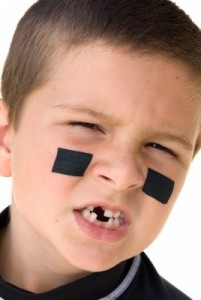 Dental injury takes place when one or more teeth is damaged or knocked out. It can be due to falls, accidents or contact sports. A survey reported that 16% of adults had experienced some sort of injury to the teeth or mouth and the figures are higher for children, with an incidence rate of 35%.
Dental injury takes place when one or more teeth is damaged or knocked out. It can be due to falls, accidents or contact sports. A survey reported that 16% of adults had experienced some sort of injury to the teeth or mouth and the figures are higher for children, with an incidence rate of 35%.
It is crucial to get the right help as soon as possible to prevent the injuries from developing into more serious conditions. In situations where seeking immediate professional help is not possible, knowing various first aid tips will be helpful in providing relief temporarily. Here are a few pointers to help handle some common dental emergencies:
Loosened or Knocked Out Tooth
If the tooth is displaced forward, backwards or sideways, try to reposition it immediately with your finger back to its original position. Do not bite on it and see your dentist as soon as possible.
If the whole tooth has been knocked out, then handle the tooth only by the crown and do not touch the root. Rinsing it with cold milk will be the best, but if there is no milk on hand, use water instead. Do not scrape off any soft tissue on the root or try to scrub it. Replace the tooth gently into the socket or you may have to push firmly if there is a blood clot. Biting on a folded cloth can help to reposition it as this will apply some pressure. Do not eat on it, choose a soft diet and arrange to see your dentist as soon as possible.
Displaced deciduous (baby) teeth should be gently repositioned if it interferes with the bite. If not they can be left and may spontaneously reposition themselves. Baby teeth that are completely knocked out should not be replaced to avoid the risk of further trauma to the underlying adult tooth.
Chipped Tooth
Do not try to re-attach a piece of the chipped tooth. Instead, take it to your dentist in a clean container in some milk or saliva. Do not self-medicate to eliminate pain symptoms. If breathing through your mouth or drinking cold fluid causes pain, biting on a clean and moist cloth for temporary pain relief.
Broken Dentures
Collect any fragments and try to fit them together before bringing them to your dentist. Some people will try and self-repair with superglue, but this is generally not advised due to the toxic nature of the glue. If any pieces are missing and you are suspicious that they have been swallowed or inhaled, then this may give rise to breathing difficulties.
Injured Lips/Tongue
Warm salt mouth rinses will help to keep the wound clean. You may also choose to use an anti-septic mouthwash with Chlorhexidine. Bleeding can be stopped with a moist gauze or cloth when pressure is applied. Do not use dry gauze as it will stick to the wound and it will bleed again when removed.
Please subscribe to our blog for more interesting dental related topics or ‘Like’ our Facebook page for the latest updates on our team activities.





